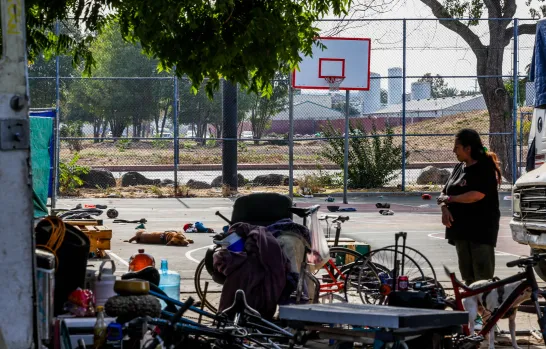Analyzing the Implications of California’s Minimum Wage Raise
Following the approval of Senate Bill 3 on Jan 1, 2023, California’s minimum wage increased to $15.50 from $15.00 per hour. The significant change was driven by the state’s renowned real estate and high cost of living. The bill aims to ensure that low-wage California workers are able to afford basic necessities such as housing, food and healthcare.
Advocates of the minimum wage increase believe that it will have a positive impact on the overall economy — increased wages signify that workers have more disposable income to spend, and they are more likely to spend it on goods and services, which in turn stimulates economic growth.
An increase in the minimum wage also benefits part-time student workers, significantly improving their financial stability and supporting them as California’s living costs rise.
Cupertino High School senior Ivy Nguyen balances schoolwork with her part-time job at Starbucks. “As a part-time worker, I feel that the economy will be more competitive, and getting jobs and internships will be more difficult. I have a couple of senior friends attempting to get a job, but they have lucked out,” Nguyen said.
Nguyen indicated that this competition directly correlates to the future of the job market — as the minimum wage rises, more teenagers will be inclined to search for a job and apply to a variety of corporations.
Although the increase in minimum wage will improve, critics say it will also lead to higher costs for businesses, which could lead to employee cuts. Small businesses will face more financial challenges than larger corporations as a result of the change. As employers are forced to minimize their staff, they will likely prioritize experienced workers, limiting job opportunities for student workers. To compensate for the wage increase, some businesses have raised their prices while carefully considering the impact on customer satisfaction.
Mr. Sun Tea, a local boba shop, intends to offer a competitive salary compared to other stores in the area. As a small business, it has become difficult for the shop to match the compensation of larger food chains like In-N-Out Burger or Starbucks. In response to the minimum wage increase, Mr. Sun had to slightly raise the prices of its drinks.
“We had to be cognizant of not drastically increasing the prices where they become a sticker shock to customers,” said Jennifer Menq, a representative of Mr. Sun. Some customers took notice of the pricing change on their menu and posted negative reviews on Yelp and Google. Mr. Sun Tea then grappled with financial responsibility while trying to preserve the customer experience — some of which is attributed to satisfactory pricing.
Oren’s Hummus, a restaurant serving authentic Israeli cuisine, also raised its menu prices recently by around 2 to 5 percent in response to the minimum wage increase. Vice President of Operations Marcus Belardes said, “As far as morale, I think workers are appreciative of the increase, but then again, in Silicon Valley, it doesn’t really make a dent in what their costs deliver.”
 Similarly, Be’Anka Ashaolu, Founder and CMO of the coffee shop Nirvana Soul, said their company increased its prices last year. She aimed to save on labor by working for free with her sister Jeronica Macey, co-founder and CEO, along with their CFO, Dapo Ashaolu. Small business owners often run their businesses off the ground – meaning they do not pay themselves. Said Be’Ank Ashaolu, “We’re doing our best to operate lean but also ensure that our team is able to get enough hours to do what they need to do.”
Similarly, Be’Anka Ashaolu, Founder and CMO of the coffee shop Nirvana Soul, said their company increased its prices last year. She aimed to save on labor by working for free with her sister Jeronica Macey, co-founder and CEO, along with their CFO, Dapo Ashaolu. Small business owners often run their businesses off the ground – meaning they do not pay themselves. Said Be’Ank Ashaolu, “We’re doing our best to operate lean but also ensure that our team is able to get enough hours to do what they need to do.”
“Minimum wage is a very divisive topic for small businesses. It can often mean a very unexpected expense increase, and I think a lot of times, people have a hard time separating small local mom-and-pop operations from large companies,” Ashaolu said. He conveyed that the issue is much more multifaceted than just increasing wages. Once inflation is incorporated, he said, it can leave people either in the same position or sometimes in even more inferior ones. He expressed that this problem must not just be looked at from one direction: a holistic view must be taken.
“How do we make housing more affordable so that the dollar raise does not just go into the landlord’s pockets? Or how do we ensure that education is affordable so that the extra money you’re getting is not just going to pay off student loans? And, in general, how do we transfer wealth from small businesses to large corporations and entities?” said Dapo Ashaolu. He instills the notion that the goal is not just to raise the minimum wage but to raise people’s standard of living.
Overall, California’s minimum wage increase is a step toward ensuring that low-wage workers in the state are able to afford basic necessities while also boosting economic growth. Many local businesses in Cupertino expressed support for the minimum wage increase, with the belief that it will lead to a more stable and productive workforce, ultimately benefiting their own bottom line.









